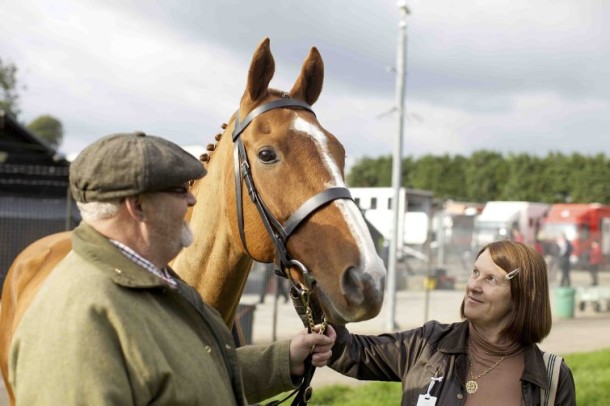 Most Americans, including myself, have limited (if any) knowledge about horse racing in the UK. Because of that, many will go into the documentary Dark Horse, which follows the career of the Welsh thoroughbred racehorse Dream Alliance, with no emotional attachment to the animal. Nor will they have any prior knowledge of the two dozen members of the Alliance Partnership, which owned the horse. But after watching the journey of both Dream Alliance and his owners, something remarkable happens late in the film during the prestigious Grand Nation horse race. As Dream Alliance leaps over a particularly daunting fence in a tension-film moment, the film abruptly cuts to black. While you stare at the seconds-long black screen anxiously waiting to see what happened, you realize just how emotionally invested in this story. It’s not surprising that documentary this exhilarating won the Audience Award for World Cinema Documentary at the 2015 Sundance Film Festival.
Most Americans, including myself, have limited (if any) knowledge about horse racing in the UK. Because of that, many will go into the documentary Dark Horse, which follows the career of the Welsh thoroughbred racehorse Dream Alliance, with no emotional attachment to the animal. Nor will they have any prior knowledge of the two dozen members of the Alliance Partnership, which owned the horse. But after watching the journey of both Dream Alliance and his owners, something remarkable happens late in the film during the prestigious Grand Nation horse race. As Dream Alliance leaps over a particularly daunting fence in a tension-film moment, the film abruptly cuts to black. While you stare at the seconds-long black screen anxiously waiting to see what happened, you realize just how emotionally invested in this story. It’s not surprising that documentary this exhilarating won the Audience Award for World Cinema Documentary at the 2015 Sundance Film Festival.
Dark Horse follows Welsh bartender (and later supermarket janitor) Jan Vokes, who decided one day that she wanted to own a racehorse. Her husband, Brian (a man so full of character that you couldn’t make him up) couldn’t talk her out of it. She soon convinced Howard Davies, a tax consultant who previously lost a good deal of money owning an unsuccessful racehorse, to join her. Together they raised money by selling shares in the horse to the bar customers at £10 a week. Finding the only half-decent sire and mare that they could with their limited resources, the group bred Dream Alliance and then raised him on a small patch of land in town. When it came time to train him, renowned trainer Philip Hobbs didn’t see much potential in the horse based on his pedigree. But Dream Alliance grew into a scrappy horse that compensated for his lack of technical skill with his desire to win (it’s hard not to think of Dream Alliance in Rocky Balboa terms). Improbably, Dream Alliance became a champion, even after a life-threatening injury and a miraculous recovery.
Director Louise Osmond could’ve made a heartwarming film by just focusing on Dream Alliance’s victories, but she digs much deeper. The underlying story is not just the rags-to-riches tale of Dream Alliance, but the class struggles of the UK. Though Dark Horse only offers glimpses of it, there is much said of the adversity that both Dream Alliance and the members of the Alliance Partnership faced by the horse racing elite. The rambunctious collection of characters who own this horse are unforgettable and stand in stark contrast with the way the traditional race horse owners are presented. The Alliance Partnership is made up of people who are living for a dream to be part of something bigger than themselves. One of the members of the partnership, Tony Kerby, recounts the town’s mining history and explains that a miner’s strike crippled the town’s economy when the mining company decided to just pick up and leave. Being part of Dream Alliance’s remarkable story obviously helped soothe the lifelong frustrations that many of the partnership members had.
For Jan in particular, owning Dream Alliance gave her the opportunity to find her individuality and make her mark on her community in a totally unexpected way. As Howard Davies says late in the film, “It’s elation when you can do something, particularly when nobody gives you a chance.”
It’s also elation to see a group of “misfits” pull together and succeed. It’s a formula that is not new to movies, but it’s always more satisfying when those oddballs are real-life figures (sorry, Rocky). A powerful documentary can make anyone care about its subject, and an even better one can entertain the audience while doing that.
Like its subject, Dark Horse succeeds far beyond expectations. Any fan of an underdog story will find so much to cheer for in this documentary.
Dark Horse opens Friday, May 6, 2016

















Recent Comments